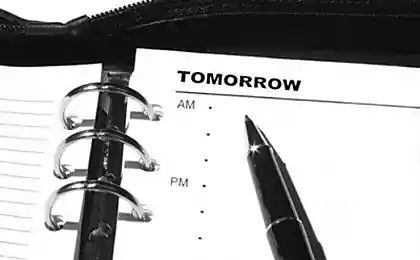456
Getting rid of excess!
It so happens that we urgently need to do business, but quickly fails — the person gets stuck on trying to make everything perfect and in full. Yes, it's called perfectionism. I want to share with you the method of "anti-perfectionism", as they say in the glossy magazines.
Wrestling — the word is inaccurate and negatively charged. To be more precise and more positive, I want to offer a method of reducing the burden in activitiesthat allow you to do things faster and without fanaticism. And call-amethod of reducing bigotry in business.

Before describing the method, I want to define in terms of. Perfectionism is setting the quality. In anything — in activities, in relationships, in lifestyle, etc.
Allocate normal and neurotic perfectionism — unpretentious, I must say, classification. I would divide the makeovers according to the degree of arbitrariness — for managed and unmanaged. Or, more precisely, a more controlled and less controlled.
Lightly managed perfectionism is a form of compulsion. And one of the ways to cope with this increase in arbitrariness.If the obsession is strong, you can go to a psychologist. If weak, you can try yourself with her... No, no way not to fight. And to increase randomness.
One of the highlights of arbitrariness is to set the priorities, choose a really important and trim excess. The art is not particularly simple — how to choose, if everything is so important. However, even in theall important is something very important, and the rest can be sacrificed. Andthe ability to choose is always useful and will allow you to manage your perfectionism, your business, and your life. So, let's get to practice.

The method cut off the excess. According to the principle of Occam's blade — not to multiply entities. In our case, not to multiply the actions and micromastia. To turn the program maximum the program optimum, and if we are really short of time and in the minimum program. So, in order:
I. description of the work.
Before you proceed, it is desirable to describe — to make for themselves the task. I propose to do so, although everyone can come up with a convenient scheme. The main thing — to clearly articulate what and why you are going to do.
To put the problem. Test question: what to do?
To highlight the quality criteria. Screening question: how to do?
To make the plan work. Make it as detailed as possible and step by step is to divide everything into small steps and assign them. Test question: What to do?
Most importantly, of course, not "be bothered" with this technical specification. If you are a perfectionist, you can "be bothered". Then it suffices to use the plan, because to set goals and identify criteria separately it is necessary to learn.
II. The weigh-in.
Everything written in the assignment is now be distributed by categories according to the degree of obligation:
Mandatory actions - that in any case it is necessary to make the point.
Required, but under other circumstances. This action, which can be considered very important and necessary, but if you still choose the speed, not the ideality, then you can do without them. In more appealing circumstances, it would need to be done, but not now. This is a subtle and important point is to separate which is a must-here-now mandatory at all.
Desirable, but optional. Is what really want to do hand drawn, but little need for them, if you think about it. This is the time when you need to choose either to do a quick, or long and beautiful.
Inertial actions. This action is undesirable, and unnecessary, but we do them just out of habit, on autopilot. If you perform, such automatism in any activity is a lot to find.
III. The cut-off.
Now take and ruthlessly strike out paragraphs 2, 3, 4. Or pitiful, but still strike out. You can leave something from point 3 to points is widely demanded in the work. But the time limit depends.
The rule of three: How to make your day as productive as possibleAs to fight with the harmful habit of procrastinating
In fact, the task is not particularly easy, if you are prone to perfectionism. Because this is often the avoidance of the selection of priorities and unwillingness something to give. And the failure itself can be experienced as impossible, as a painful loss. The mind creates a million reasons not to throw out of the plan. It's struggling with a physical reality, in this case — with the fact that time is short. And life is not so infinite.published
Author: Danila Gulyaev
P. S. And remember, only by changing their consumption — together we change the world! ©
Source: danilling.livejournal.com/54133.html
Wrestling — the word is inaccurate and negatively charged. To be more precise and more positive, I want to offer a method of reducing the burden in activitiesthat allow you to do things faster and without fanaticism. And call-amethod of reducing bigotry in business.

Before describing the method, I want to define in terms of. Perfectionism is setting the quality. In anything — in activities, in relationships, in lifestyle, etc.
Allocate normal and neurotic perfectionism — unpretentious, I must say, classification. I would divide the makeovers according to the degree of arbitrariness — for managed and unmanaged. Or, more precisely, a more controlled and less controlled.
Lightly managed perfectionism is a form of compulsion. And one of the ways to cope with this increase in arbitrariness.If the obsession is strong, you can go to a psychologist. If weak, you can try yourself with her... No, no way not to fight. And to increase randomness.
One of the highlights of arbitrariness is to set the priorities, choose a really important and trim excess. The art is not particularly simple — how to choose, if everything is so important. However, even in theall important is something very important, and the rest can be sacrificed. Andthe ability to choose is always useful and will allow you to manage your perfectionism, your business, and your life. So, let's get to practice.

The method cut off the excess. According to the principle of Occam's blade — not to multiply entities. In our case, not to multiply the actions and micromastia. To turn the program maximum the program optimum, and if we are really short of time and in the minimum program. So, in order:
I. description of the work.
Before you proceed, it is desirable to describe — to make for themselves the task. I propose to do so, although everyone can come up with a convenient scheme. The main thing — to clearly articulate what and why you are going to do.
To put the problem. Test question: what to do?
To highlight the quality criteria. Screening question: how to do?
To make the plan work. Make it as detailed as possible and step by step is to divide everything into small steps and assign them. Test question: What to do?
Most importantly, of course, not "be bothered" with this technical specification. If you are a perfectionist, you can "be bothered". Then it suffices to use the plan, because to set goals and identify criteria separately it is necessary to learn.
II. The weigh-in.
Everything written in the assignment is now be distributed by categories according to the degree of obligation:
Mandatory actions - that in any case it is necessary to make the point.
Required, but under other circumstances. This action, which can be considered very important and necessary, but if you still choose the speed, not the ideality, then you can do without them. In more appealing circumstances, it would need to be done, but not now. This is a subtle and important point is to separate which is a must-here-now mandatory at all.
Desirable, but optional. Is what really want to do hand drawn, but little need for them, if you think about it. This is the time when you need to choose either to do a quick, or long and beautiful.
Inertial actions. This action is undesirable, and unnecessary, but we do them just out of habit, on autopilot. If you perform, such automatism in any activity is a lot to find.
III. The cut-off.
Now take and ruthlessly strike out paragraphs 2, 3, 4. Or pitiful, but still strike out. You can leave something from point 3 to points is widely demanded in the work. But the time limit depends.
The rule of three: How to make your day as productive as possibleAs to fight with the harmful habit of procrastinating
In fact, the task is not particularly easy, if you are prone to perfectionism. Because this is often the avoidance of the selection of priorities and unwillingness something to give. And the failure itself can be experienced as impossible, as a painful loss. The mind creates a million reasons not to throw out of the plan. It's struggling with a physical reality, in this case — with the fact that time is short. And life is not so infinite.published
Author: Danila Gulyaev
P. S. And remember, only by changing their consumption — together we change the world! ©
Source: danilling.livejournal.com/54133.html























